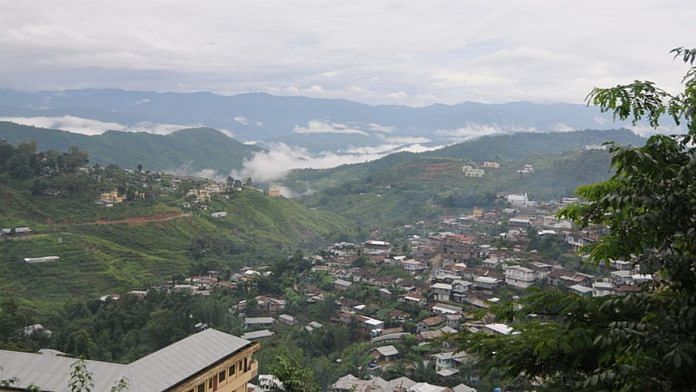New Delhi: Three youngsters from Nagaland’s Viswema village have set up a stall called ‘Going Local’ with an aim to introduce the idea of street food culture in the area. The stall, set up by Neisal Theyo, Mhasheto Kraho and Khoneinü Kin, also aims to promote local products and businesses. Viswema village is located in Nagaland’s Kohima district.
The three youths have partnered with local entrepreneurs and friends to sell locally-available products such as Nagaland coffee, organic ginger ale from Khonoma village, cupcakes and honey from Viswema, and oyster mushrooms from Kohima. They also sell indigenously made rosella and gooseberry tea, panipuri and chole (chickpea).
“It is a humble initiative with low investment. Our main motive is to encourage our youngsters that we can earn through such ventures. While supporting local businesses, we also wanted to spread awareness on our local products,” Neisal Theyo told The Morung Express.
Theyo added, “The response has been really good. We posted about our stall on WhatsApp and other social media sites and the response was quick. Some people visited out of curiosity, while many came to show their support. We even have regular customers.”
Farmer in Assam’s ‘bee village’ pioneers mustard-honey agriculture method
Nitul Bhuyan, from Sandahkhowa village in Assam’s Lakhimpur district, has brought smiles on the faces of fellow farmers with his unique agricultural method that includes combining mustard seeds and beekeeping. Lakhimpur district in Assam is one of the most flood-prone and erosion-affected areas of the state.
Bhuyan had introduced this method 12 years ago on 100 hectares of land and it is now followed by 128 other households in the village. Sandahkhowa has also earned the status of a ‘bee village’ by the RARS (Regional Agricultural Research Station) in Lakhimpur.
“The bee-keeping with mustard plants compliments each other,” Bhuyan told The Assam Tribune. “The pollination by the honey bees in mustard flowers increases the number of production of the oil seeds to 20 per cent more in every bigha of land besides producing honey.”
The villagers keep six boxes of bees in every bigha of land with mustard plants. One kg of honey is produced from one box in a week’s time from each bigha.
Manipuri man stumbles upon ‘long lost’ busts of renowned figures at a remote village
A Manipuri youth accidentally stumbled upon busts of some legendary figures that have been lost to the ages. The youth released a video of his discovery at a small village called Wakha in Imphal district.
The busts were reportedly made by a man, in memory of a deceased patriarch called Ch Jayenta Singh, to keep the history of state alive. The figures include sports personalities, artists, politicians and social scientists.
Many in the state have now suggested that the plot where the busts were found should be converted into a state memorial site.
NGO’s organic farm helps restaurants supplying food during quarantine
Bethany Society, an NGO in Meghalaya’s Shillong, has been helping restaurants supplying food to people under quarantine with fresh and organic vegetables from its garden. The charitable society, which also runs an inclusive school, trained its pupils on natural farming. Around 25 of those trained also have a self-help group known as Kanmanroi.
The organisation believed that the best way to cherish Christmas was by having access to good nutrition. “We are very clear that we don’t want to be promoted as an organisation. The whole idea is that those who are left behind should get an opportunity, especially at Christmas time,” Carmo Noronha, executive director of Bethany Society, told The Northeast Today.
Students would earlier also sell handmade Christmas cards, made out of recycled old clothes and papers collected from schools and colleges, and sell these at the local markets.
Also read: Arunachal revives 1,000-yr-old handmade paper industry that went extinct a century ago



